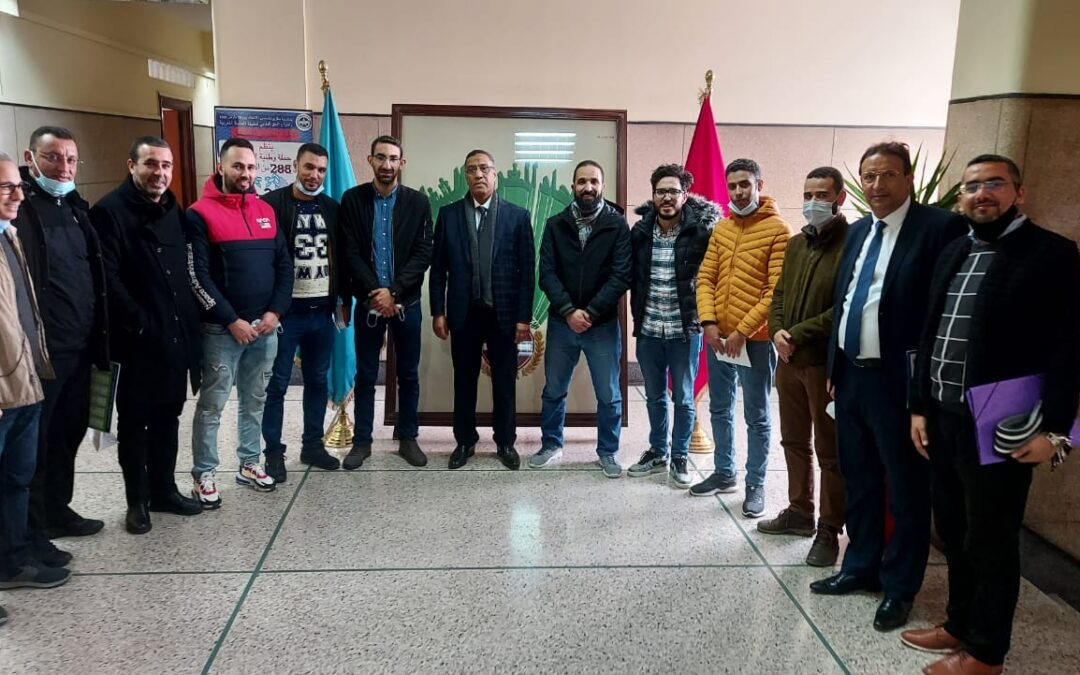
Feb 23, 2021
Workers in Morocco are denouncing efforts by a Peugeot Citroen factory to force union leaders to resign from the Moroccan Labor Union (UMT) or lose their jobs. Already, one union leader has been fired, according to the union.

One worker was injured during a closed-door session with factory employers, according to UMT. Credit: UMT
Last week, factory management forced 11 union activists to sign resignation letters after compelling them to spend three hours behind closed doors where union leaders say they were subjected to questioning and harassment that seriously injured one worker.
“This violation of workers’ rights sullies the image of our country,” UMT says in a statement. “We call upon all local authorities to intervene in our case, and we call for the solidarity of workers at the company, and from unions across Morocco.”
Union members met in a general assembly over the weekend, where they stood strong for their rights to form a union and bargain collectively, and proceeded with planned union elections.
Over the past few months, the workers have protested the non-payment of overtime at the factory and waged a strike earlier this year at the plant in Kenitra, on Morocco’s northwestern coast. In 2019, Peugeot SA recorded more than $4 billion in profits.
The General Confederation of Labor (CGT) in France, which represents workers at Peugeot, supported the workers’ strike in Kenitra and vowed to assist them in their current struggle.
Union leaders say they expect management to announce this week whether the workers forced to sign resignation letters will be officially fired.
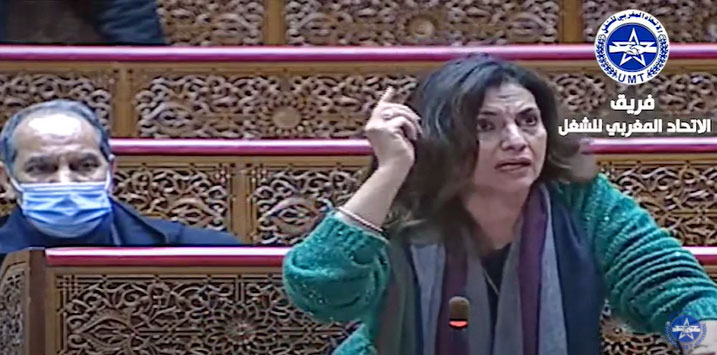
Feb 11, 2021
A 14-year old girl was among the 28 garment workers killed in a factory disaster in Tangier, Morocco, this week. Her mother says she had worked at the factory, an illegal sweatshop, for three years.
The workers were drowned or electrocuted after a flood caused a short circuit. Seventeen others were injured. The facility operated in an underground garage in a residential area with 130 workers, most of them women. A nearby resident rescued some of the workers by throwing a rope into the flooded factory.
“How could this factory have been a secret? Where were the labor inspectors? Where were the local government authorities? Where were the investors?” asked Amal El Amri, a representative in Morocco’s upper house of Parliament and Moroccan Labor Union (UMT) member.
Residents in the area say the sweatshop operated for more than 20 years.
“We must ensure a voice for these workers who have died, and for the many thousands more women workers who toil under the same dangerous conditions,” El Amri said. In January, a fire at another illegal textile factory in Tangier injured one person and destroyed the factory, where 400 people worked.
The UMT and Democratic Labor Confederation (CDT), both Solidarity Center partners, demanded an immediate investigation into the tragedy, and the CDT said in a statement that it holds the state, the government and the employers fully responsible for the workers’ deaths.
Fast Fashion Industry Spawns Illegal Factories
Across from Spain on Morocco’s northern coast, Tangier is a key hub of Morocco’s textile manufacturing. Countrywide, official statistics show 1,200 textile companies with 165,000 workers—27 percent of the country’s industrial employment.
Yet many factories in Morocco’s textile and leather industry—estimates range in the thousands—operate illegally, forcing workers to labor long hours for low pay in often dangerous conditions. A 2012 investigation revealed that workers in illegal Moroccan textile sweatshops work, on average, 55 to 65 hours per week—11 to 21 hours more than the legal limit.
Operating outside national labor laws or standards, illegal factories are a direct response to the demands of the fast fashion industry, in which large brands demand quick response to fashion changes and customer demands and so draw on subcontractors whose workforce is cheaper and its work arrangements informal.
With no job stability and few social protections, garment workers in the informal economy are subject to exploitation and abuse, with no health coverage, pensions or other social and legal protections. Some one-third of Morocco workers are in the informal economy, which accounts for 14 percent of the country’s gross domestic product.
‘Companies Must Be Held Accountable’
As the global labor movement joins in calls for accountability in a supply chain where workers pay the price for cheap production, the Morocco Contribution Forum is urging the government to close all workplaces without health and safety protections and establish a policy to ensure severe penalties for companies operating outside the law.
Public officials must “improve the rights and living standard of marginalized people who are victims of oppression and violence, whether it is on the way to work, or in the workplace, and to provide them with the minimum conditions of human rights,” the Forum, a Solidarity Center partner, said in a statement.
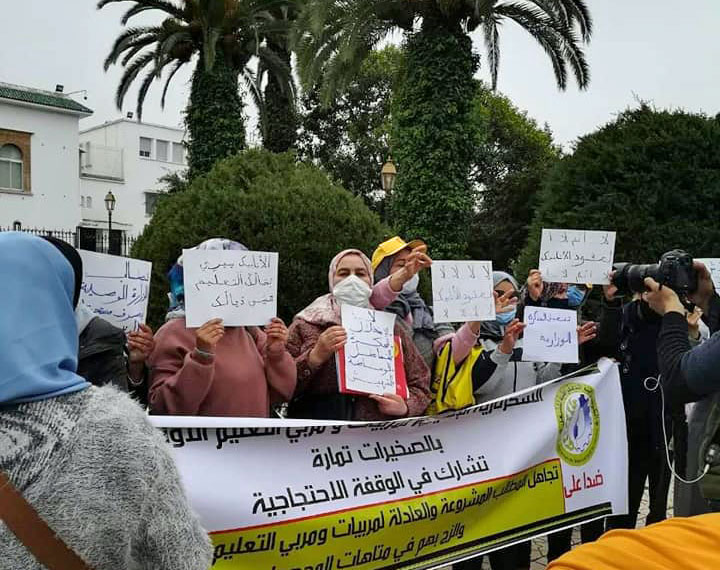
Feb 4, 2021
Teachers carried out protests throughout January against a government crackdown on their fundamental freedom to strike, with rallies at the Ministry of National Education and Vocational Training in the capital, Rabat, and across the country. Teachers also are protesting the working conditions of contractual teachers and the Ministry of Education’s refusal to engage in social dialogue.
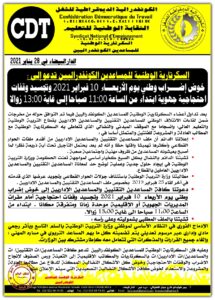
The CDT is calling for nationwide protests February 10 around education worker demands. Credit: CDT
Morocco’s constitution has protected the right to strike since 1962, but the government seeks to revise the country’s labor law by adding significant obstacles to the right to strike, in violation of Morocco’s international legal obligations. Unions are calling on the government to engage in real social dialogue to develop legislation consistent with international law.
“These abusive measures constitute a flagrant violation of the constitution, of the guarantee of the right to strike and of national laws, as well as against international conventions that consider the right to strike a fundamental part of freedom of association,” the Democratic Labor Confederation (CDT) wrote in a December letter to Educational International. The global federation, Education International, strongly supports the CDT and the National Union of Teachers (SNE) in their efforts to push back against the government’s moves to limit essential worker rights.
The government also barred a planned December 22 sit-in on at the Education Ministry headquarters in Rabat, citing exceptional circumstances and the law on health emergencies. Union members and leaders called the ban illegal and said security service used force to disperse them before they could reach the Ministry’s headquarters.
The January actions follow a series of rallies and sit-ins across Morocco last fall, including a national general strike on December 1 and 2, as teachers protested the government’s move to reduce their seniority and promotion opportunities and its replacement of full-time teachers with teachers on contract who are paid lower wages and have no job security.
Education Officials Refuse to Meet with Teachers
Morocco’s workers and their unions have been left out of discussions regarding management of the COVID-19 crisis and educational continuity, according to the SNE-CDT. The union says the ministry has not fully addressed health and safety conditions for teachers, education support staff and pupils.
Education ministry officials have frozen dialogue with teachers, last meeting with them in February 2019. One of the union’s fundamental demands is for the government “to open a serious and responsible dialogue on the outstanding demands from 2014 to today, and the respect of trade union freedoms and the right to strike.” Among the unresolved issues are improved wages, a voice for teachers in the education reform process, investment in public education, teacher training and more staffing to lower classroom size.
In early January, the CDT also spoke out against the ministry’s unilateral decision to cancel upcoming examinations for middle and high school students due to the pandemic, highlighting another example of how the education ministry fails to involve the representatives of teachers and other employees of the public school system in decision making.
More Teachers on Contract, with Few Rights
In early 2019, a government decree removed the option of workers with renewable two-year employment contracts to integrate into the public sector, a move that means contract teachers have no access to fair wages and social benefits like pensions, health care or job security. The CDT has sought to replace fixed-term contracts with permanent employment.
The number of fixed-term teaching contracts is increasing in Morocco and undermines the core notion of public service. The change grants the government a waiver on its obligations, according to a recent CDT field study on the future of work in the education sector, carried out in collaboration with the Solidarity Center. “Some of the direct results of casualization, as identified through the study, include instability, precariousness, dissatisfaction and lack of confidence in the profession’s future,” the CDT notes.
The study also finds an increasing number of women in all levels of the education system, and the future of work in the education sector must address this shift, says Younes Firachin, a member of the National Office of the National Education Union. That requires unions “to fully grasp these transformations” to effectively reach them and address their concerns, he says.
Employees throughout the public education system, frustrated by the lack of attention to their terms and conditions of employment, increasingly are joining the protests. On January 27, many who provide assistance to young children in kindergarten and primary school rallied in Rabat.
The CDT also announced a series of nationwide protests set for February 10 to mobilize administrative and technical assistants to call for their recognition by the Ministry of Education and Morocco’s public school system.
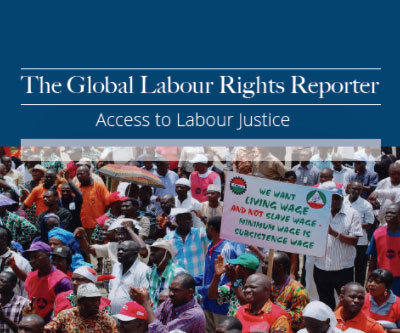
Feb 3, 2021
Labor lawyers and other worker rights advocates from around the world took part in the launch of a new law journal dedicated to advancing justice for workers.
The Global Labour Rights Reporter, a project of the Solidarity Center’s International Lawyers Assisting Workers (ILAW) Network, intends to be a global forum for labor and employment law practitioners, who also will grapple with the legal and practical issues that directly affect workers and their organizations.
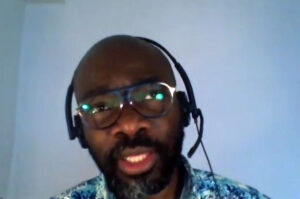
The journal “gives us the language to fight our battles, it gives us the language to discuss our struggles”—Paapa Danquah
Authors who contributed to the first issue, with its theme, “access to justice,” yesterday shared their contributions to the journal, which includes 10 articles and is available online in English, French and Spanish.
“The labor movement is about expanding justice for all workers,” Solidarity Center Executive Director Shawna Bader-Blau said in opening remarks. “The network is the first effort to bridge and build a pro-labor network of lawyers that has labor justice at its heart.”
The journal “gives us the language to fight our battles, it gives us the language to discuss our struggles,” said Paapa Danquah, legal officer for the International Trade Union Confederation (ITUC).
The Solidarity Center launched the ILAW Network in December 2018 as a global hub for worker rights lawyers to exchange ideas and develop strategies to best represent the rights and interests of workers and their organizations. Since then, more than 600 hundred individuals and organizations from more than 70 countries have joined.
Justice Delayed, Justice Denied

Ensuring reparations are efficient and timely is key to achieving worker justice, says Matías Cremonte. Credit: Solidarity Center
Several participants discussed workers’ lack of access to courts and the legal process as a major block for workers attaining justice.
For instance, it took 22 years to get a judgment in the case of a manufacturing plant in Brazil, where 60 workers were killed, 59 of them women, said Matías Cremonte, regional vice-president of the Latin American Association of Labor Lawyers.
“When it came time to enforce the decision, it couldn’t be done because the conditions don’t exist anymore,” he said. “Unjustified backlogs and delays by the government led to very profound damage.” Ensuring reparations are efficient and timely is key to achieving worker justice, he said.
Cremonte and María Paula Loranzo co-authored “The Right to Fair and Satisfactory Working Conditions: Risk Prevention and Access to Justice,” which explores workers’ access to compensation for occupational safety and health violations in Argentina, especially since the COVID-19 pandemic.

Raisa Liparterliani shared how unions in Georgia succeeded in restoring many worker rights that were eliminated. Credit: Solidarity Center
In addition to the institutional and practical challenges the judiciary faces, “it is not uncommon that employers will maintain a blacklist of the so called unwanted and dangerous—those who have applied to court to defend their rights,” Raisa Liparterliani, deputy chairperson of the Georgian Trade Union Confederation, wrote in the journal.
Speaking today, Liparteliani also documented concrete measures to address worker rights, sharing how unions succeeded in restoring many worker rights that were eliminated during 2005 reforms.
Discussing his article on Zimbabwean court practices, scholar Munyaradzi Gwisai said limited access to courts has denied workers a cornerstone of labor justice. “You can have rights in the constitution and labor rights, but they can be frustrated by the judiciary.”
Holding Global Supply Chains Accountable
By bringing together labor lawyers and worker rights activists, the Global Labour Rights Reporter seeks to share new strategies for ensuring worker justice, and Avery Kelly at the Corporate Accountability Lab described one such effort to enforce the legal rights of garment workers and others in the corporate supply chain.
The program, which sought to address the lack of enforcement in supplier codes of conduct, involved 14 U.S. companies, including major apparel brands, signing contracts giving supply chain workers legal rights to enforce the supplier codes of conduct. Kelly and her co-authors documented the case study in their journal article.
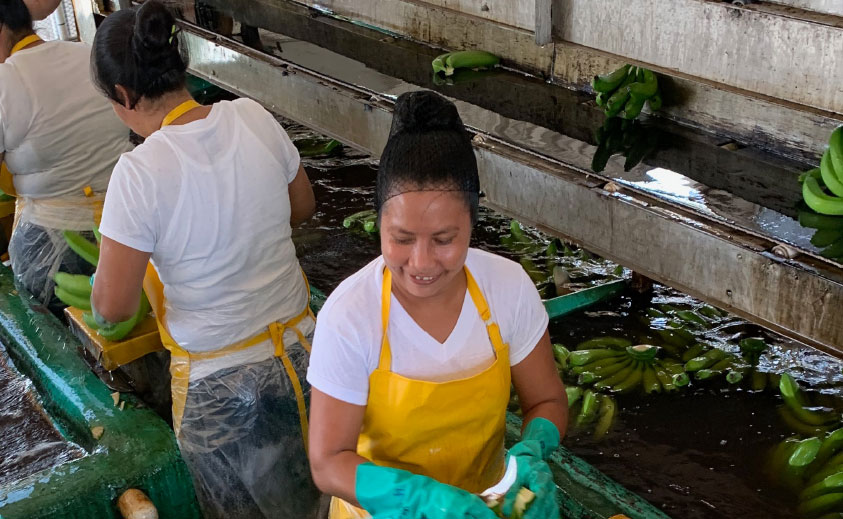
Jan 28, 2021
Unionized workers on Guatemala banana plantations earn more, work fewer hours, face less sexual harassment, and have safer workplaces, including during the Covid-19 pandemic, according to a Solidarity Center report. (The report also is available in Spanish.)
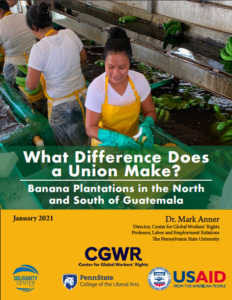 “What Difference Does a Union Make? Banana Plantations in the North and South of Guatemala” finds that non-unionized workers in the country’s south earn less than half the hourly pay of unionized workers in the north, while working 12 hours per week more. Thirty-nine percent of all bananas sold in the United States are produced in Guatemala.
“What Difference Does a Union Make? Banana Plantations in the North and South of Guatemala” finds that non-unionized workers in the country’s south earn less than half the hourly pay of unionized workers in the north, while working 12 hours per week more. Thirty-nine percent of all bananas sold in the United States are produced in Guatemala.
Working conditions are very similar to modern slavery at the two-thirds of Guatemalan banana plantations not unionized, said César Humberto Guerra López, national secretary of labor and conflicts for SITRABI (Union of Banana Workers of Izabal). “The Labor Ministry and the courts are guardians of business interests, they are not on the side of the workers.” Guerra spoke at a Solidarity Center panel event yesterday to discuss the report’s findings. (Watch the full event here.)
While plantation workers in the North on average are paid $2.52 an hour, those along the Pacific Coast in the south are paid $1.05 an hour, said Mark Anner, director of the Center for Global Workers’ Rights and professor of labor and employment relations at Pennsylvania State University. Anner is author of the report, which surveyed 210 workers between September 2019 and March 2020.
“Workers without trade unions around the world, and Guatemala in particular, have lower paying jobs, more dangerous jobs, jobs with abuse and fewer rights,” said Solidarity Center Executive Director Shawna Bader-Blau in the panel’s opening remarks. “So what difference does a union make? It makes all the difference to workers in Guatemala.”
Far More Sexual Harassment at Nonunion Banana Plantations

Irís Munguía discussed the challenges women on banana plantations face when they don’t have a union to advocate for their rights. Credit: Solidarity Center
In one of the report’s most notable findings, 59 percent of women surveyed in non-union banana packing plants say they face sexual harassment and other forms of gender-based violence at work compared with 9 percent of women at unionized packing plants. Non-union workers are 81 percent more likely to face verbal abuse than union workers.
“If a woman reports someone who is harassing her, that woman could be fired. Because he’s the boss and we are the workers,” Irís Munguía said, speaking through a translator. Munguía, women’s coordinator of the Honduran Federation of Agro-industrial Unions-FESTAGRO, was the first woman coordinator of COLSIBA, the Latin American coordinating body of agricultural unions.
The report cites Carmen, a SITRABI union leader, who says sexual harassment and other forms of gender-based violence are much lower in unionized facilities because unions hold employers accountable. “If a man touches me, I can inform the company. Managers have been fired [for sexual harassment]. There is more respect now. And if someone doesn’t respect us, the issue goes to the union-management committee.”
Banana Workers Killed for Seeking to Form Unions
Workers have not formed unions in the south because “there is fear, panic to organize in a union,” according to Guerra. He said that when workers in the southern region last attempted to form a union in 2007, one union leader was killed and the daughter of another union leader raped, while other union activists received threats. “The consequences of fear continue to be very palpable for the workers,” he said.
Anner said his research found that between 2004 and 2018, 101 union activists were killed in Guatemala for trying to form unions and achieve decent work. The majority of those murders took place in the Southern part of Guatemala, in the regions where non-union banana plantations have expanded in the last two decades.
With no unions to champion worker rights, banana plantations and packing plants in the south do not comply with laws limiting working hours, regulating wages or ensuring safety, Guerra said. Workers labor 12 hours a day, Monday through Saturday.
Agricultural and production facilities have moved work to the south to pay the lowest wages. As the report makes clear, the root causes for the push for low wages goes to the top of the supply chain. “Fruit companies no longer wield power in the production process, that power is slowly being displaced by mega supermarkets that constantly look for ways to squeeze prices,” the report says.
“Wal-Mart requires such low prices that multinational corporations are pushing the directly owned facilities in the north to outsource to the south,” Anner said. And that means seeking out plantations in a nonunion region where wages are brutally low.
The report also finds that all production facilities that engage in worker rights violations have been inspected by private certification programs, including by Global G.A.P. and Rain Forest Alliance. “Management tells workers what to say to the certification inspectors before the inspectors arrive,” the report finds.
The Union Difference
Guerra and Munguía, long-time union leaders who began working on banana plantations in their teens, shared their successes in helping workers achieve their rights through unions.
In the north, SITRABI has 17 negotiated collective agreements, and wages at one plantation, a Del Monte subsidiary, are three to four times higher than at non-union facilities, Guerra said.
Munguía described a landmark regional agreement COLSIBA negotiated with Chiquita that ensures zero tolerance for sexual harassment and gender-based violence at work. The agreement covers banana workers in Costa Rica, Guatemala, Honduras and Panama. The agreement shows “the importance and the great difference in belonging to the union and not being unionized.”
“Dignity on the job and just livelihoods—this is something we can reach only through union organizations,” Munguía said.
Joell Molina, Solidarity Center trade union strengthening director, moderated the panel. The report was commissioned by the Solidarity Center under the USAID-funded Global Labor Program and written by Center for Global Workers’ Rights/School of Labor and Employment Relations at Penn State University, is co-published by the Center for Global Workers’ Rights.











 “
“